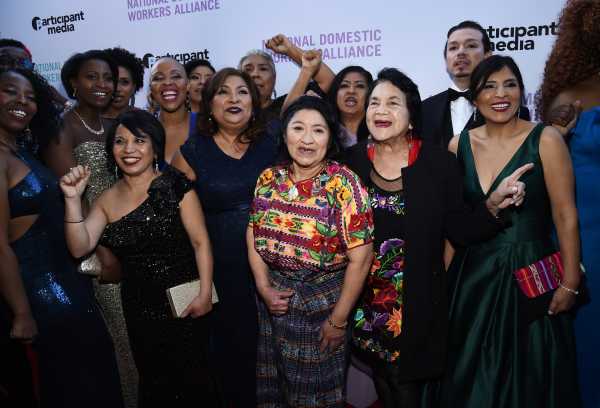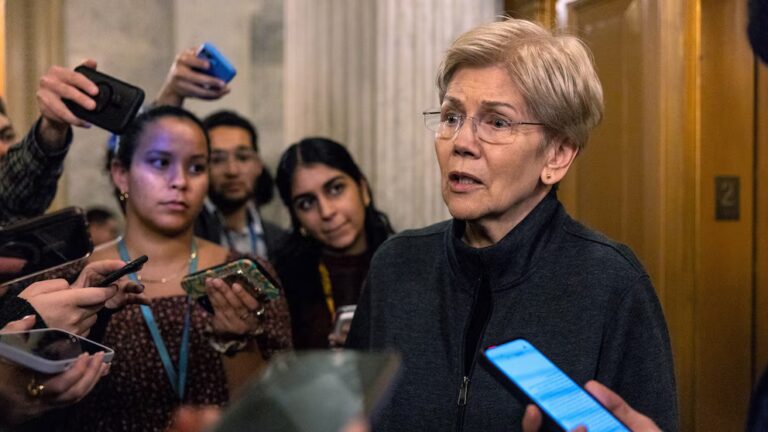
One of the most thankless professions in the US — and one of the fastest-growing — had its moment in the spotlight Sunday during the 91st Academy Awards ceremony.
As he received an Oscar for the movie Roma, Mexican director Alfonso Cuarón paid tribute to millions of housekeepers and nannies who spend their lives taking care of other families.
“I want to thank the Academy for recognizing a film centered around an indigenous woman, one of the 70 million domestic workers around the world without work rights, historically relegated to the background of the cinema,” he said during his acceptance speech for the Best Director award.
The movie’s central character, Cleo, is a housekeeper of Mixtec heritage (one of Mexico’s largest indigenous groups) who works for an affluent family in 1970s Mexico City. The portrayal of Cleo by Yalitza Aparicio, an indigenous actress from Oaxaca, drew international praise and sparked discussions about the lack of indigenous representation in pop culture. The movie also drew applause from housekeepers, nannies, and other domestic workers who often feel invisible in the global economy.
Domestic workers in the US are taking advantage of the Roma buzz to raise awareness about their second-class status in the US workforce. They want the public to realize that housekeepers, nannies, and home health aides have fewer rights than other workers: Most of them aren’t protected from sexual harassment and discrimination under federal law, and they don’t have the right to unionize. They’ve been campaigning to change that, and now they’ve enlisted Hollywood’s help.
Last week, Cuarón recorded a public service announcement supporting the National Domestic Workers Bill of Rights, a congressional bill that would give all domestic workers the same legal rights afforded to other workers, plus some new ones: paid sick days, regular scheduling, and retirement benefits.
Sen. Kamala Harris (D-CA) and Rep. Pramila Jayapal (D-WA) plan to introduce the bill this spring, according to the National Domestic Workers Alliance, which represents about 2 million nannies, housekeepers, and home health aides across the country.
“This [bill] will provide us with the respect, dignity, and recognition that we all deserve,” June Barrett, a home health aide from South Florida, told me. Barrett has been advocating for the bill, and got the chance to meet Cuarón Sunday in Hollywood during a red carpet event for domestic workers. She’s worked as a nanny and housekeeper for more than 14 years, she told me, and said the story of Cleo in Roma was her story, too, and the story of millions of poor women who leave their own families to take care of someone else’s.
The domestic workers’ campaign is part of a broader effort to mobilize an isolated workforce that is often overlooked and exploited under the law. It’s also an attempt to gain economic security for one of the fastest-growing and lowest paid occupations in the US.
Domestic workers are in high demand, but have little leverage
Only one industry is expected to grow faster and add more jobs to the US economy than domestic work in the coming years: the renewable energy business.
After that, home health aides and personal care assistants are expected to be the fastest-growing occupations within the next decade — with about 1.2 million new positions added to the US economy between 2016 and 2026, according to the latest estimates from the Bureau of Labor Statistics.
That spike is expected for two main reasons. First, the baby boomer generation is aging, and a growing number of families will likely hire aides to help care for them at home. Second, the expansion of Medicaid insurance under the Affordable Care Act has made it possible for more low-income families to cover the cost of home care services.
But even though domestic workers are in high demand, they are among the lowest-paid workers in the country, and most get no benefits. The median annual salary for a home health aide was $23,000 in 2017, slightly above the $20,420 federal poverty level for a family of three. About 88 percent of domestic workers don’t have paid time off or other benefits either.
Congress is largely to blame for this.
Congress intentionally left out domestic workers from US labor laws
When Congress first passed federal labor protections in the 1930s as part of the New Deal, they excluded two groups of workers: domestic workers and farm workers.
The Fair Labor Standards Act (FLSA), for example, excluded both groups from the right to earn the minimum wage or get overtime pay. Farmworkers and domestic workers were left out as a concession to Southern lawmakers, whose states were highly invested in paying low wages to personal servants.
At the time, that workforce was overwhelmingly black and Latinx, and excluding them from a minimum wage was intentional. Today, about a quarter of farmworkers and 67 percent of housekeepers earn less than the minimum wage.
Lawmakers later amended the FLSA in the 1970s to cover most domestic workers, but not live-in housekeepers and nannies. Farmworkers are still excluded from the law.
Both groups were also excluded from the National Labor Relations Act of 1935, which gave workers the right to form labor unions and organize for better working conditions.
Then, when Congress passed the Civil Rights Act in 1964, domestic workers were left out inadvertently. The law didn’t include protections for workers whose employers have fewer than 15 employees. That means it’s technically legal for employers to sexually harass their nannies and housekeepers, or to discriminate against them based on race, religion, gender, or national origin.
The same thing happened a few years later, in 1970, when Congress passed the Occupational Health and Safety Act. The landmark labor law, which established a worker’s right to a safe and healthy work environment, also left out domestic workers and farmworkers.
This is not a tiny part of the workforce. More than 12 million US workers — about 10 percent of the workforce — worked for firms with fewer than 10 employees in 2017, according to data from the Department of Labor (the data set does not have a category for firms with fewer than 15 employees).
Millions of them are housekeepers, nannies, home health care aides, and other occupations made up mostly of women of color. They’re also farmworkers who harvest crops at small family farms.
These overlooked workers are now demanding equal treatment from Congress. Last week, House Democrats introduced the Fairness for Farm Workers Act, which would give agriculture workers the same minimum wage and overtime protections as the rest of the US workforce. Domestic workers are also campaigning for equal rights under federal law.
The Domestic Workers Bill of Rights would close the loopholes
The fact that housekeepers and nannies can’t unionize has made it hard for them to fight congressional efforts to exclude them from labor protections. So instead, they began organizing at the national level in 2007, launching the National Domestic Workers Alliance. The nonprofit group advocates for housekeepers across the country, and has pushed change at the state level.
So far, eight states have passed laws extending labor protections to domestic workers: Oregon, California, Connecticut, Illinois, New York, Massachusetts, Hawaii, and Nevada. In July, the city of Seattle did too.
Now the group is taking their campaign to Capitol Hill. Hundreds of domestic workers have been traveling to Washington, DC, in the past year to talk to lawmakers about their need for federal labor protections. In April, a group of them met with Harris, Jayapal, and Sen. Elizabeth Warren (D-MA).
And Democratic lawmakers are listening.
In November, Harris and Jayapal announced their plan to introduce the National Domestic Workers Bill of Rights. They are currently drafting the bill, and domestic workers expect it to be introduced this spring.
The bill would close all the loopholes in federal labor laws that exclude domestic workers. It would also require employers to give them meal breaks, rest breaks, and some paid sick days. In addition, employers would have to establish fair scheduling practices and a system for workers to report sexual harassment.
“Passing this Bill of Rights will demonstrate that domestic work is not only work, but work that is critical to our economy and society,” wrote Harris, Jayapal, and Ai-Jen Poo in a November op-ed for CNN. “We must extend protections to those who have been silenced and overlooked for decades.”
Domestic workers are not so silent anymore. Not only have they persuaded high-profile Democrats in Congress to join their cause, they now have Hollywood on their side too.
On Sunday, Poo, the executive director of the National Domestic Workers Alliance, attended the Oscars ceremony as Cuarón’s guest. The group also hosted a red carpet event for dozens of domestic workers from around the country.
Barrett, the home health aide from Florida, told me she attended the event and met Cuarón.
She said she kissed the Oscar trophy he received for directing Roma.
“Who would have thought that a girl from Jamaica with no parents, who’s been raped and abused, would ever be able to have that opportunity?” she told me. “There’s power in organizing and power in telling our stories.”
Sourse: vox.com






